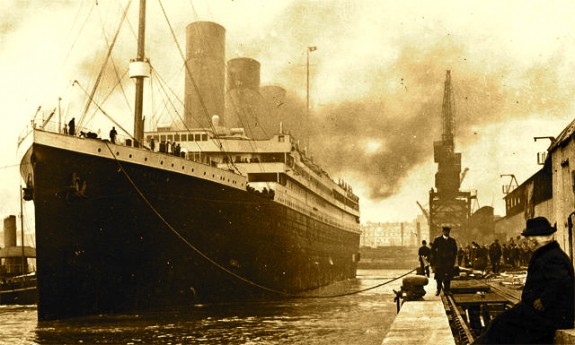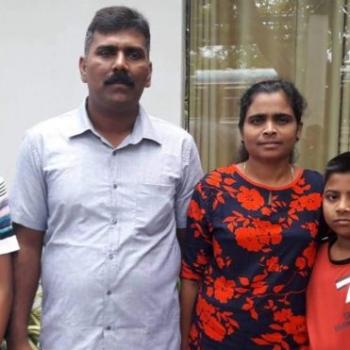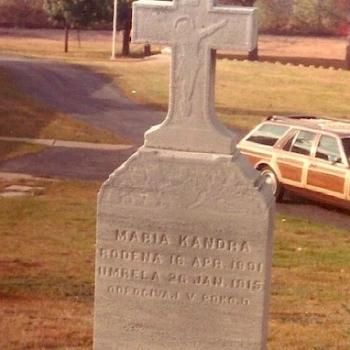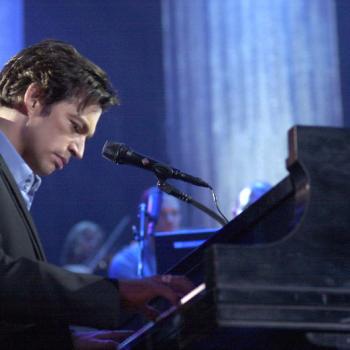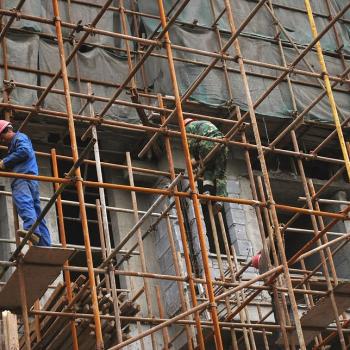You never know how the Holy Spirit will work. After posting this weekend’s homily, I got a number of comments from people who said that the man I’d used as a springboard for a reflection on conversion and mercy had, in fact, renounced his conversion. (I couldn’t find any evidence of this from Googling, but it sounded credible.) Shortly after that, I stumbled on this stirring account of one of the priests on the Titanic. Deeply moved, I wondered if there was a way to tie it in to this Sunday’s scripture. The result — a revised version of this week’s homily — is below. I wrote it Saturday afternoon and delivered it Saturday night. I also recorded it. Click the green arrow below for the audio. Dcn. G.
[audio:http://wp.patheos.com.s3.amazonaws.com/blogs/deaconsbench/files/2012/04/HOMILY041512.mp3|titles=HOMILY041512]Every year on the Sunday after Easter, the greatest celebration of faith, we encounter the gospel’s greatest story of doubt: the story of Thomas, who demands proof before he will believe.
We live in an age when there are many Thomases – doubters and disbelievers. Some end up in search of answers, and it can change their lives in profound ways. This is the story of one of them.
His name was Roussel Byles. He was born in England in 1870, and grew up the son of a Congregationalist minister. Roussel went on to Oxford, where he studied mathematics, history and theology. While at Oxford, he converted to the Church of England. He was thinking of becoming an Anglican priest – but continued to question and seek answers that the Anglican faith could not answer.
During this time, his older brother William decided to convert to Catholicism. Not long after, despite desperate pleadings from his mother, Roussel himself joined the Catholic Church. He took at his baptism the name of the most famous doubter in history, Thomas.
In time Thomas Byles felt himself called to the priesthood. He studied in Rome, and was ordained in 1902.
His brother William, meantime, moved to New York to run a business. There, William fell in love with a young woman from Brooklyn. He invited his priest brother, now Father Thomas Byles, to preside at the wedding, at St. Augustine’s Catholic Church in Brooklyn. Father Byles happily accepted. His family arranged for him to travel to America in April of 1912, just a few days after Easter.
He was booked on the maiden voyage of the Titanic.
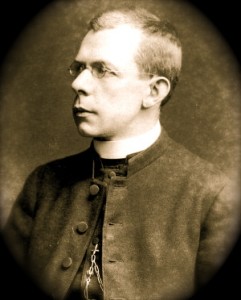 Exactly 100 years ago, Sunday, April 14th, 1912, Fr. Byles celebrated Mass. It was “Low Sunday” for the first Sunday after Easter. He read the exact same readings we just heard, and those who were on board said he preached a homily about using prayer as your life vest, and the sacraments to save your soul in a spiritual shipwreck.
Exactly 100 years ago, Sunday, April 14th, 1912, Fr. Byles celebrated Mass. It was “Low Sunday” for the first Sunday after Easter. He read the exact same readings we just heard, and those who were on board said he preached a homily about using prayer as your life vest, and the sacraments to save your soul in a spiritual shipwreck.
That night, he was walking the upper deck, wearing his topcoat, and praying his breviary, when the Titanic struck that fateful iceberg.
Fr. Byles remained on the ship, hearing confessions, offering prayers. Twice, he was offered a seat on a lifeboat and he refused. People gathered around him and he blessed them and gave general absolution. He went into third class, where the servants and working class people were staying. Many were Catholic. He heard confessions and offered blessings. He led those on board in reciting the rosary. People on the lifeboats later said they could hear his voice calling out the prayers, and people of every language answering back. Loudest of all, they could hear the desperate pleas: “Holy Mary, Mother of God, pray for us now and the hour of our death, Amen…”
Shortly after 2 a.m., the ship slipped into the Atlantic and disappeared. Some 1500 people perished. One of them was Father Byles. His body was never recovered.
In Brooklyn, William Byles and his fiancée went ahead with their wedding, a low Mass presided over by another priest, a friend of the bride. After the ceremony, they changed into clothes for mourning, and returned to the same church for a requiem Mass.
A year later, William and his wife traveled to Rome and were granted a private audience with Pope Pius X, who had heard the story of Father Byles. He told William his brother was a martyr for the faith.
This Sunday, as we hear again the story of a Thomas who doubted, remember this story of a Thomas who sought and believed.
And remember this: God never gives up on those who earnestly seek Him.
In the gospel, after the apostle Thomas adamantly, even angrily, expressed his doubt, Christ didn’t dismiss him. He didn’t write him off.
Christ came back.
He gave Thomas another chance, and offered him the gift of faith – and Thomas, overwhelmed and awed, accepted.
When we least expect it, Christ will break through locked doors of the human heart. He will find us, in our fear and uncertainty. He understands our misgivings, our hurts, our weaknesses. He knows only too well the human condition. As the apostle Thomas discovered: he has the wounds to show for it.
And he wants to give us another opportunity.
That, too, is part of the message of this weekend. This is a time for seizing second chances.
This Sunday, we mark Divine Mercy Sunday, when we embrace the power and beauty of God’s forgiveness – when we strive, more than ever, to let Him break through the locked doors of our hearts.
It is a time for fulfilling the promise of the Resurrection, the glorious hope of Easter.
Christ has left the tomb.
If we choose to, so can we.
We can step out of the tomb of selfishness and sin. We can feel the healing light of God’s care. We can take that second chance.
God’s mercy, Divine Mercy, assures it. The Sacrament of Reconciliation enables it.
We can be made new.
Fr. Thomas Byles spent the last hours of his life making that possible for hundreds of people during one of the darkest tragedies of the last century. On a cold and terrifying night, he remained first and foremost a priest, offering to those who needed it the light of Christ.
It is a light offered to all of us.
As we gather around the table of the Lord, and prepare to receive Him in the Eucharist, pray to let that light into our hearts. Let us welcome Jesus into our own locked upper room, and ask him to break through all the barriers that might be keeping Him out of our lives, so that we might say, with the apostle who doubted yet came to believe:
“My Lord and my God.”

